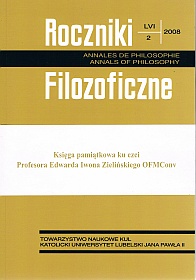The Chronology, Structure and Analysis of John Duns Scotus’s Question On Individuation from the Quaestiones super libros Metaphysicorum Aristotelis VII, qu. 13
Abstract
The paper is devoted to the question of the principle of individuation in Bl. John Duns Scotus. This question is found in his commentary to Aristotle’s Metaphysics, namely the Quaestiones super libros Metaphysicorum Aristotelis VII, qu. 13. The first part of the paper discusses problems connected with the chronology and structure of the text, whereas the second one is presented as Scotus’s teaching on individuation.
S. Dumont and T. Noone argue today on the traditional thesis about the origin of this question and the remaining philosophical writings from the juvenile stage of Scotus’s philosophical work. They claim that some questions from the In Metaph., including also qu. 13 from the book, were written later or in the same time as the commentaries to Peter Lombard’s Sentences. The authors support their views by indicating the following: 1) the text the In Metaph. is better organised, 2) the vocabulary used with reference to the principle of individuation, especially the term haecceitas, is employed twice in the text In Metaph., 3) the quotations from the later works of Scotus and the works of authors who wrote somewhat later than that date of the In Metaph. hitherto presumed, 4) some stylistic terms indicate that the author of the text was a mature person. The traditional thesis is defended by I. Modrić on behalf of the Scotistic Commission. Having made a detailed analysis, Modrić rejected all the arguments from the introduction to the critical edition of the In Metaph. The author of this paper agrees with Modrić’s view. Therefore as long as we do not have a thesis to the contrary we shall hold the traditional opinion about the earlier origin of the In Metaph. in comparison to Peter Lombard’s commentaries on the Sentences.
Scotus opens his lecture on individuation with a discussion of various standpoints on this issue. He divides them into positive and negative theories of individuation. This ordering ensures a clear exposition of various views without unnecessary repetitions and vagueness. Eventually, Doctor Subtilis rejects all hitherto views and provides his own solution. The principle of individuation is for him an individuating entity, the ultimate reality of the individual being. In combination with common nature it determines the most individual of possible characterisation of the individuum. This positive individuating entity is called an individual form (forma individualis) in the In Metaph., a degree of entity (gradus entis) and haecceitas. The latter became a technical term to define the Scotist principle of individuation.
References
Dumont S. D.: The Question on Individuation in Scotus “Quaestiones super Metaphisicam”, [w:] Via Scoti. Methodologia ad mentem Joannis Duns Scoti. Atti del Congresso Scotistico Internazionale Roma 9-11 marzo 1993, a cura di L. Sileo, Roma: PAA-Edizioni Antonianum, 1995, t. I, s. 193-227.
Gilson E.: Avicenne et le point de départ de Duns Scot, „Archives d’histoire doctrinale et littéraire du moyen age” 2 (1927), s. 89-149.
Introduction, [w:] B. Ioannis Duns Scoti Quaestiones super libros Methaphysicorum Aristotelis, lib. I-V, ed. R. Andrews, G. Etzkorn, G. Gàl, R. Green, F. Kelley, G. Marcil, T. Noone, R. Wood, t. III, St. Bonaventure, N. Y : The Franciscan Institute St. Bonaventure University 1997.
Koszkało M.: Problematyka „Principium individuationis” w „Lectura in librum secundum Sententiarum” Jana Dunsa Szkota, „Acta Mediaevalia” t. XIII, Lublin 2000, s. 129-215.
Koszkało M.: Indywiduum i jednostkowienie. Analiza wybranych tekstów Jana Dunsa Szkota, Lublin: TN KUL 2003.
Kržanić Ch.: La conoscenza diretta ed immediata del singolare da parte dell’intelletto secondo Duns Scoto, [w:] De doctrina Ioannis Duns Scoti. Acta Congressus Scotistici Internationalis Oxonii et Edinburgii 11-17 sept. 1966 celebrati, t. II, Romae 1968, s. 65-70.
Longpré E.: La philosophie du B. Duns Scot, Extrait des „Etudes franciscaines”, Paris 1924.
Longpré E.: De editione «Operum Omnium» Ioannis Duns Scoti relatio, Ad Claras Aquas Florentiae 1937.
Marchesi A.: Il principio di individuazione delle realtà naturali e create secondo Duns Scoto, [w:] Homo et Mundus. Acta Quinti Congressus Scotistici Internationalis Salamanticae, 21-26 septembris 1981, ed. C. Bérubé, Romae 1984, s. 355-562.
Meßner R.: Das Individuationsprinzip in skotischer Schau, „Wissenschaft und Weisheit” 1 (1934), s. 16-19.
Modrić L.: L’edizione critica delle “Quaestiones super Metaphisicam” del B. G. Duns Scoto, „Antonianum” 73 (1998), s. 581-592.
Noone T. B.: Scotus’s critique of the thomistic theory of individuation and the dating of the “Quaestiones in libros metaphysicorum”, VII q. 13, [w:] Via Scoti. Methodologia ad mentem Joannis Duns Scoti. Atti del Congresso Scotistico Internazionla Roma 9-11 marzo 1993, a cura di L. Sileo, t. I, Roma: PAA- Edizioni Antonianum 1995, s. 396-406.
Pini G.: Una lectura scotista della Metafisica di Aristotele: l’Expositio in libros Metaphysicorum di Antonio Andrea, [w:] Documenti e studi sulla tradizione filosofica medievale. Rivista della Società Internazionale per lo Studio del Medioevo Latino II, 2 (1991), s. 529-586.
Salamon W. G.: Koncepcja poznania intuicyjnego u Jana Dunsa Szkota, (Biblioteka Instytutu Franciszkańskiego, 22), Niepokalanów 2007.
Shibuya K.: Duns Scotus on ‘ultima realitas formale’, [w:] Giovanni Duns Scoto. Sudi e ricerche nel VII Centenario della sua morte in onore di P. César Saco Alarcón, a cura di M. Carbajo Nuñez, t. I, Roma: Antonianum 2008, s. 379-394.
Stella D.: Il tema dell’individuale tra innovazione e regressione, [w:] Regnum Hominis et Regnum Dei. Acta Quarti Congressus Scotistici Internationalis Patavii 24-29 sept. 1976 celebrati, ed. C. Bérubé, t. I, Romae 1978, s. 381-???.
Surzyn J.: Koncepcja natury wspólnej Jana Dunsa Szkota, „Studia Antyczne i Mediewistyczne” 4 [39] (2006), s. 165-178.
Wadding L.: Censura, [w:] De Quaestionibus Doctoris subtilis in Metaphysicam, ed. L. Wadding, t. IV, 1637 (reprint: Hildsheim: Olms 1968-69), s. 499-500.
Copyright (c) 2008 Roczniki Filozoficzne

This work is licensed under a Creative Commons Attribution-NonCommercial-NoDerivatives 4.0 International License.





